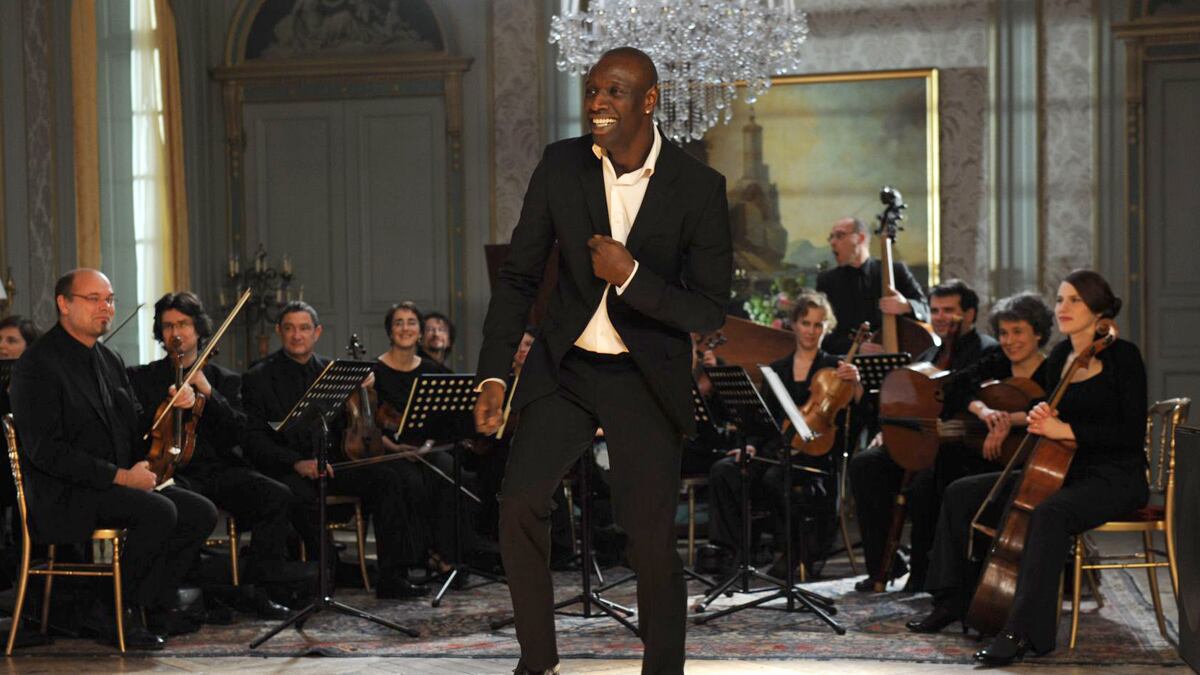A few months ago, a French police officer in uniform bummed a cigarette from actor Omar Sy outside a bistro on Paris’s Champs de Élysées. She shot the breeze with him as if they were long-lost pals, but Sy was a little leery at first. Having grown up in the French projects, or banlieues, the cops had never been chummy with a 6-foot-2 black guy like him.
But it was only one of many surreal moments the 34-year-old actor has experienced since winning the César, France’s top acting honor, and starring in one the country’s biggest hits ever, The Intouchables. After so many encounters with strangers who felt they knew him, he realized that maybe his film about a street-smart caretaker and his aristocratic, disabled boss had helped break through some stereotypes.
“It was funny,” he said thinking about the cop and cigarette. “But to actually smoke a cigarette with a police officer where I came from … well, there is something absurd and weird and super about it. It gives me hope that things can get better.”
At the moment things could not be better for Sy. In February, Sy won the César for his performance as the free-spirited, rough-around-the-edges caretaker named Driss—beating out The Artist’s Jean Dujardin. He was the first black actor ever to win the coveted prize. And the movie has been outperforming Hollywood blockbusters like Harry Potter and the Deathly Hallows—Part 2 in territories throughout Europe.
The film will be released in the United States today and will also be remade in English with Colin Firth in the role played by acclaimed French actor François Cluzet. Although a few American critics have condemned the film for Uncle Tom typecasting, Sy dismisses the charge as ignorant. “The social context in France and the U.S. is not the same,” he said. “If there had been any hint of a racist undertone I would not have done it, obviously.”
After 14 years in television and film and on stage, Sy is feeling more settled and mature. He smiles frequently and with joyful sincerity, and his raven-colored skin is unblemished and taut. He has traded in his white diamond earring on his left lobe for a more discreet black diamond. But sudden international fame has taken him aback. He is grateful—grateful for the praise, grateful for the attention, even grateful for his new American agent at UTA and the two attractive, black-clad publicist/translators that take him around L.A.

“When we think we have reached a milestone something else happens,” he said in rapid-fire French. “Nothing in my younger life could have told me I would have needed to know how to speak English. Now I wish I had paid more attention in English and German classes.”
And yet, if his parents had one wish, it was to see their eight children excel in school. His Senegalese father married his mother, who is from Mauritania, and then emigrated to France. His father worked in the stockroom of a Porsche manufacturing company and put his dreams aside to bring home money for his family. All of their children were born in France and they were told that getting an education was the only way out of the projects.
“I understood from a very young age that school was important and that my parents were making great sacrifices for me,” he said. “Every morning I saw my father get up and go to a job that he didn’t really like. They came to France for the same reasons all immigrants move to another country—so their kids could have a better way of life.”
But a month before le baccalauréat, when most French students are cramming and panicking for the high-school exam that will determine whether they will go on to college, Sy was in Cannes doing skits for a radio show. To no one’s surprise, he flunked. But a few months later he had signed a deal with the French production company Canal Plus to do a show based on phony radio call-ins.
The idea morphed into a television show called Omar et Fred, where Sy and comedian Fred Testot take turns posing as wacky customers complaining about strange things and phone-company receptionists taking the calls. In one show, Omar calls the phone company to complain that his cellphone’s virtual secretary is racist. Watching Sy in costumes and in all his silliness, it might be difficult to imagine him in a dramatic comedy about a tough young man caring for a disabled widower.
But Sy, the fourth child, was always mischievous, curious, and made people laugh. He found that he could get attention by being funny. Laughter was also his way of dealing with the hardship he saw in the projects.
“When you grow up like me you have to adapt,” he said. “There is an element of suffering and my way of dealing with it was through humor. It was my bridge for dealing with the negativity.”
Codirectors Olivier Nakache and Erik Toledano, who also wrote the screenplay, had known Sy for years and did not want anyone else for the part of Driss. The real-life caretaker, Abdel Sellou, grew up in the projects and was once “an experienced pickpocket, talented con man, and charismatic gang leader,” according to the publisher of his memoir, You Changed My Life. He is now running a chicken farm in Tunisia with his wife and three children. The character’s honesty and lack of pity for the guy in the wheelchair offered great opportunities for comedy.
“It is good when you laugh and in the dramatic scenes,” said Nakache. “Omar never took comedy or acting classes. He has got this little je ne sais quoi … He has a light.” Sy easily slipped into Driss’s shoes. “Omar doesn’t have the flaws of an actor, he is very spontaneous and natural,” said Toledano. “And he has the same story as our hero. He was perfect for this. When I saw him for wardrobe fittings, he was really the guy from the ghetto. It was so true, so realist. That is what we were looking for—the credibility of the character.”
Sy has been the guy in the ghetto, but he has also defied expectations.
“When I was young, a lot of things were closed off to me. I was always told, don’t do this, you can’t do that—instead of stopping me, it made me think, I can do that, I must do that,” he said. “People only look at you and say you are black and you are from the banlieue and all the doors are closed. I had the desire to be something else. If I see a door that is a little open, I will find a way to get through.”
And while he is enjoying the fame and money and the traveling, one of the proudest moments in winning the César was being able to prove to his mother that acting can indeed be a profession. She never understood his career choice and always saw it as unstable and vague. She really wanted her son to take his bac and get on with his life. The statuette is in Sy’s home, in a forested suburb of Paris where he lives with his wife and children. But he framed the diploma and presented it to his mother.
“Even with 14 years of constant work in my career, it took that symbol to appease her and for her to finally say OK,” he said. “For my parents, there was a residue of colonization, the shyness and temerity of thinking, we are not French. But I was French. I was born there. I was not afraid. They didn’t know how to advise and protect us, but I knew I wanted to go there and to explain it to my parents and to give them the reassurance that it would be OK.”






